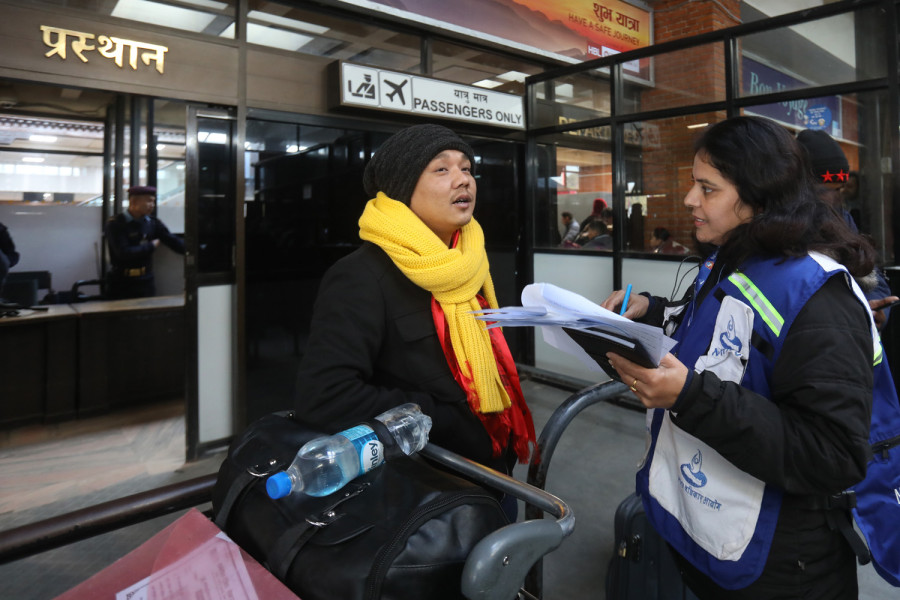National
Nepali migrant workers continue to remain exploited and ill-informed about their jobs
In a random survey at Kathmandu airport, National Human Rights Commission finds migrant workers are still paying hefty fees for overseas jobs, and remain ill-informed about working conditions.
Chandan Kumar Mandal
Kul Bahadur Gurung recalled paying Rs225,000 for a taxi driver job in Abu Dhabi. However, it was in 2014 when Gurung, originally from Nawalparasi district, migrated to work abroad.
After five years, when he was in Nepal, he hoped that things for migrant workers might have changed for the better. But he found things were still mostly the same for the tens of thousands of Nepali workers like him, who leave the country for a job.
“I had paid a hefty amount for my job five years ago,” Gurung told the Post at the Tribhuvan International Airport while returning to work in Abu Dhabi, the capital of the United Arab Emirates. “Many of the friends who have been working with me are still paying huge amounts of money for the jobs which are freely available. Hardly five percent has changed in reality in the last five years.”
The random monitoring by the rights watchdog, coinciding with the International Migrants Day, at the country’s sole international airport once again revealed everything wrong and prevalent in the country’ foreign employment sector, plagued by mismanagement and exploitation of workers.
Nepali workers, going for overseas jobs, continue to remain exploited and ill-informed about foreign employment.
During the survey on Wednesday morning, most of the workers were found paying hefty sums of money to manpower agencies and their sub-agents against the government policy of Free Visa and Free Ticket, barring recruiting agencies from charging more than Rs10,000 for their services.
“I had to pay Rs100,000 to a recruiting agency for a job in Saudi Arabia,” said Ramesh Gurung, who is from Chitwan.
Many of these workers, who were en route to various labour destination countries, admitted that they did not currently have the job contract paper that they had signed with the employer. Nor many of them were informed about the facilities they were promised in the agreement and agencies to reach out in case of help needed or left stranded abroad.
“I neither know where to seek help in case of a breach of contract nor will I complain,” said Suresh Sah, a migrant worker from Sabaila Municipality in Dhanusha. “I will simply continue working because I have invested money for the job, and I need to earn so that I clear my loans.”
Cheating of Nepali migrant workers by recruiting companies and their agencies by overcharging for jobs abroad, and providing different jobs, remuneration and facilities than that promised in the original work contracts are rampant. However, their ordeal does not end at home.
Once they take up jobs in foreign countries, unsafe and exploitative working conditions await workers, leaving them injured, vulnerable to occupational diseases and at times dead.
A majority of the workers screened at the airport before departure also lacked enough information on local laws, language, religion, culture and other rules of the countries where they would be working for the next few years.
The human rights body conducted the monitoring to see how aware migrant workers are about their rights, whether they were hired under ethical recruitment practices, possess the documents and how the airport authority behaves with migrant workers. The Commission found that while the majority of the workers were migrating without any skill training, the free visa and free ticket policy was far from being implemented.
“Management and security have significantly improved at the airport in comparison to previous years,” said Sudip Pathak, a member of the National Human Rights Commission, Nepal. “The rest of the things regarding workers’ awareness of their rights, security and hiring process remains mostly unchanged.”




 9.83°C Kathmandu
9.83°C Kathmandu














